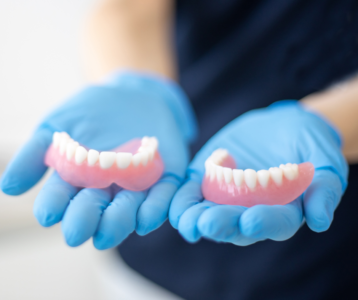People frequently consult their dentist or periodontist for guidance on the best technique to repair lost teeth when they experience tooth loss. Dentures could be the best option for someone in this regard who has lost a tooth. Indeed, dental implants have been praised as one of dentistry’s finest innovations.
The following is the necessary information regarding how dentures work:
What are Dentures?
Complete dentures come in two varieties: conventional and instant. Conventional dentures are created after tooth extraction when the underlying bone and gum tissue have had time to recover. Conversely, instant dentures can be positioned as soon as the teeth are removed because they are produced in advance. Therefore, you do not have to go without teeth while your gums and bone are recovering.
Other types of dentures include partial dentures or bridges that are removable, just like complete dentures. Replacement teeth are often connected to a pink or gum-colored plastic base. The denture is kept in place in your mouth by connecting to or snugly fitting against neighboring teeth, which is occasionally joined by a metal framework. Fixed bridges are also an option in some circumstances. The bridge, which in this instance consists of one or more artificial teeth, is affixed in place with cement.
How do Dentures Work?
Each full or partial denture is manufactured to fit your mouth’s size and shape. To assess how your upper and lower jaw relates to one another, the first step is to take imprints of your jaw and measurements of your mouth. Molds and other forms are created from these impressions, giving you a model to test to see how your dentures will fit.
Dentures will feel different for every person, just like retainers and other dental appliances that might be worn. They may typically feel weird or loose for the first few weeks until your cheek and tongue muscles can hold them in place. When you initially start wearing them, it is also typical to have slight irritation; however, this usually goes away over time.
After having new dentures, you might discover that some words are challenging to say. Speaking with dentures will become second nature to you with time and practice.
Eating with dentures can be challenging and takes some getting used to. During the first few weeks of wearing, many new users report experiencing some pain. Though it might be challenging initially, getting used to your new dentures and returning to your regular diet won’t take long. Even after you become used to wearing dentures, you should still steer clear of foods with hot, sticky, or sharply edged or shelled ingredients. Additionally, it would help if you refrained from using toothpicks and chewing gum when wearing dentures.
Typically, porcelain and resin are used to create the teeth on dentures. Porcelain was typically the material of choice since it was more robust and long-lasting. The biggest drawback of porcelain dentures is that they can wear down natural teeth if they bite against them and are breakable if dropped. For these reasons, complete dentures, as opposed to partial dentures, are more frequently made of porcelain.
Acrylic resin has recently gained ground as the main component in dental implant production. Acrylic is substantially less expensive than porcelain, and better adheres to the denture base. It is also lighter, easier to modify, and weighs less. The drawback of resin teeth is that they deteriorate more quickly than porcelain teeth, changing how they come into contact with one another.
You could be required to wear your dentures for the first few days, even while you sleep. Although it could be unpleasant, this is the best technique to find parts of the denture that need adjusting. It is typically advised that you take off your dentures before going to bed after making any required adjustments.
Conclusion
Dentures are a fantastic solution for people who have lost teeth. Denture implants can cause pain, discomfort, and irritability; however, as the gums and remaining teeth get used to the fixture, they provide the best support to your oral well-being. If you would like to know more please contact River Valley Smiles today at (479) 646-0706!

